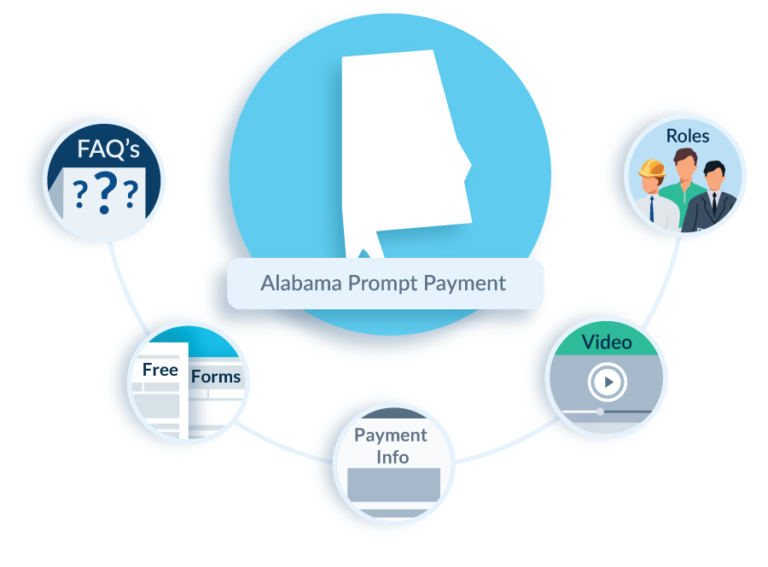Alabama Prompt Payment Requirements
- Private Jobs
- Public Jobs
- Top Links
Prime Contractors
For Prime (General) Contractors, progress payment due within 30 days of request for payment; unless otherwise agreed
Subcontractors
For Subcontractors, 7 days after payment is received above; unless otherwise agreed.
Suppliers
For Suppliers, 7 days after payment is received above; unless otherwise agreed.
Interest & Fees
Interest awarded at 1% a month; attorneys fees to the prevailing party.
Prime Contractors
For Prime (General) Contractors, progress payment due within 30 days of request for payment.
Subcontractors
For Subcontractors, payment due within 7 days after payment is received above; unless otherwise agreed.
Suppliers
For Suppliers, payment due within 7 days after payment is received above; unless otherwise agreed.
Interest & Fees
Interest at the current statutory rate.
Prompt payment laws are a set of rules that regulate the acceptable amount of time in which payments must be made to contractors and subs. This is to ensure that everyone on a construction project is paid in a timely fashion. These statutes provide a framework for the timing of payments to ensure cash flow and working capital.
Projects Covered by Prompt Payment in Alabama
The state of Alabama regulates prompt payment on both private and public construction projects.
Private Projects
Private projects in Alabama are governed by Ala. Code §§8-29-1 to 8-29-8. These statutes regulate payment on all private construction projects except residential home builder projects, residential projects of 16 units or fewer, and contracts that are under $10,000. For all other private projects within the state these deadlines for payment will act as default rules, in case the contract doesn’t address the issue.
Payment Deadlines for Private Projects
Once a prime contractor has performed in accordance with their contract, they can submit a pay application to the owner. Upon receipt, the owner has 30 days to release payment to the prime contractor. In turn, when the contractor receives payment, they have 7 days to make payment to their subs and suppliers on the project. Also, the same 7-day turnaround applies to all other payments down the chain.
Late Payment Penalties for Private Projects
There are certain reasons that a party may withhold payment, if so then the paying party may withhold up to 2 times the amount in dispute. If, however, payment is late or wrongfully withheld, the unpaid amount will begin to accrue interest at a rate of 1% per month. Furthermore, in an action for a claim under these prompt pay laws, the prevailing party will be entitled to attorney fees and court costs.
Public Projects
Alabama has a separate set of statutes that regulate public works projects. These statutes are found in Ala. Code §41-16-3, for state projects, and §39-2-12 for local/municipal projects.
Payment Deadlines for Public Projects
Once a prime contractor has performed in accordance with their contract, they are entitled to payment from the public entity within 30 days after receipt of a proper invoice on state projects; and 35 days of approval of the invoice on local/municipal projects. If the entity disputes the request for payment, they must notify the prime within 15 days of receipt.
After receiving payment from the public entity, the prime must pay its subs and suppliers within the terms of the contract, or if silent, then within 7 days after payment was received. This 7-day payment deadline applies to all other payments down chain on the project. If the contractor, sub, or sub-subcontractor disputes the request for payment, they must notify the party within 5 days of receipt.
Late Payment Penalties for Public Projects
The statutes set out specific reasons that payment can be withheld. However, if none of these are present, and payment is late or wrongfully withheld, interest will accrue at a rate of the “legal amount currently charged by the state” or if on a local/municipal government project, the rate assessed for the underpayment of taxes set by the US Secretary of Treasury.

